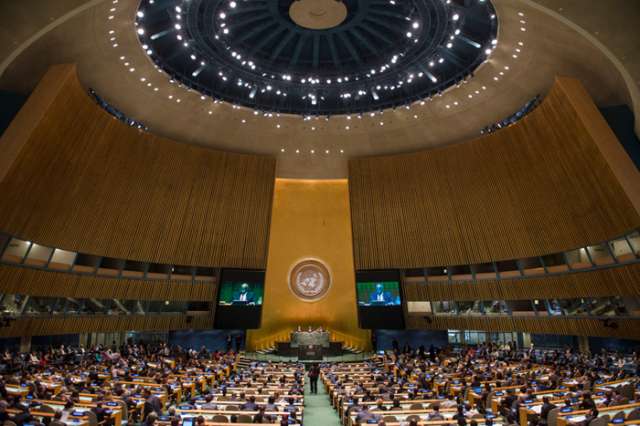"Today our world continues to be re-shaped by globalization, urbanization, migration, demographic shifts and other seismic trends. New threats have emerged, from climate change to cyber-crime and pandemics.
"In many respects, the world is shifting beneath our feet. Yet the Charter remains a firm foundation for shared progress.”
"He highlighted a number of threads that run through the activities of the Organization, from human rights and peacekeeping to humanitarian assistance and sustainable development.
"These include a greater emphasis on prevention, mediation, and the peaceful resolution of disputes and grievances, as well as strengthening peacebuilding in order to sustain peace and keep post-conflict societies from repeating cycles of disaster.
"He also highlighted addressing the roots of conflict, including through heightened attention on violations of human rights – often the warning signs of worse to come, as well as providing adequate and predictable resources.
"Let us take inspiration from the good news of the past week,” Mr. Ban said, highlighting in particular the adoption of the new global sustainable development agenda; tangible support for UN peace operations; momentum on climate change; high-level commitments to gender equality; and encouraging steps to address the refugee crisis.
"Alongside despair in many corners, there remains great hope in the power of working together. That is the founding spirit of the United Nations – and in this 70th anniversary year, in the face of grave and global challenges, it is the spirit we must summon today.”
General Assembly President Mogens Lykketoft noted that over the past 70 years, the UN’s approach, capacity and responsibilities in the area of peace and security have undergone major changes.
“Yet today, with unsolved conflicts in many parts of the world and with millions of women and children greatly affected, it is clear that the UN has much more to learn and much more to do, to fulfil its mandate.”
Preventing conflict from breaking out in the first place is “the epitome of success” in this field – and by far the best investment in maintaining peace and security, he said.
Also, since the UN was founded and the Charter adopted, the nature of security challenges, conflicts and threats have continued to change, he said, noting that the UN has responded and continues to adapt to these ever-changing challenges.
In this regard, he pointed to the report of the high-level independent panel on peace operations, which the General Assembly will take up on 12 October, as well as the ongoing 10-year review of the peacebuilding architecture, which will enable the UN to “face head on” the uncertainties of building and sustaining peace and the ever-present risk of lapse or relapse into conflict.
Mr. Lykketoft added that, in the same vein, the global study on Security Council resolution 1325 on women, peace and security allows for taking stock and devising ways to better address this key aspect of international peace and security.
“A UN that is truly fit for purpose is in our common interest,” he stated. “It is our responsibility to ensure that the UN can respond in a timely, well-calibrated and effective manner.
“This requires a concrete, sustainable, and more effective budgetary framework for special political missions. And this also includes the longstanding issue of Security Council reform, which will continue to receive attention during this session.”
More about:















































